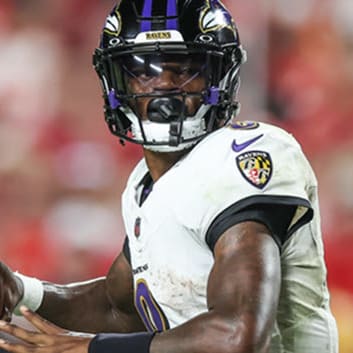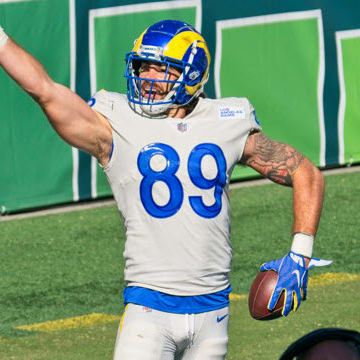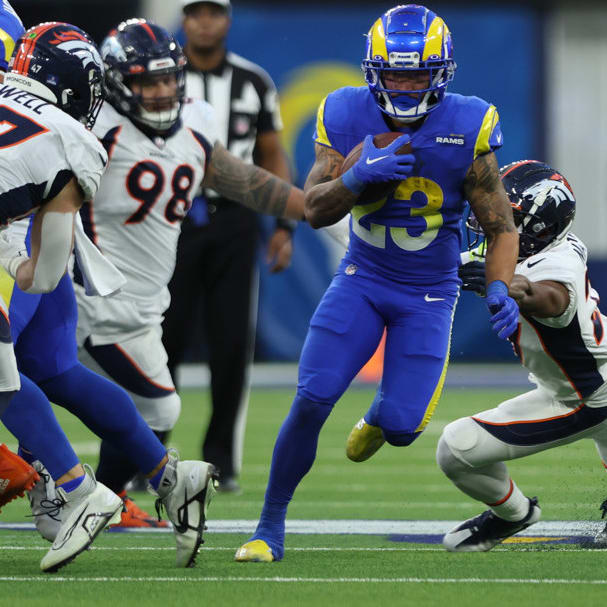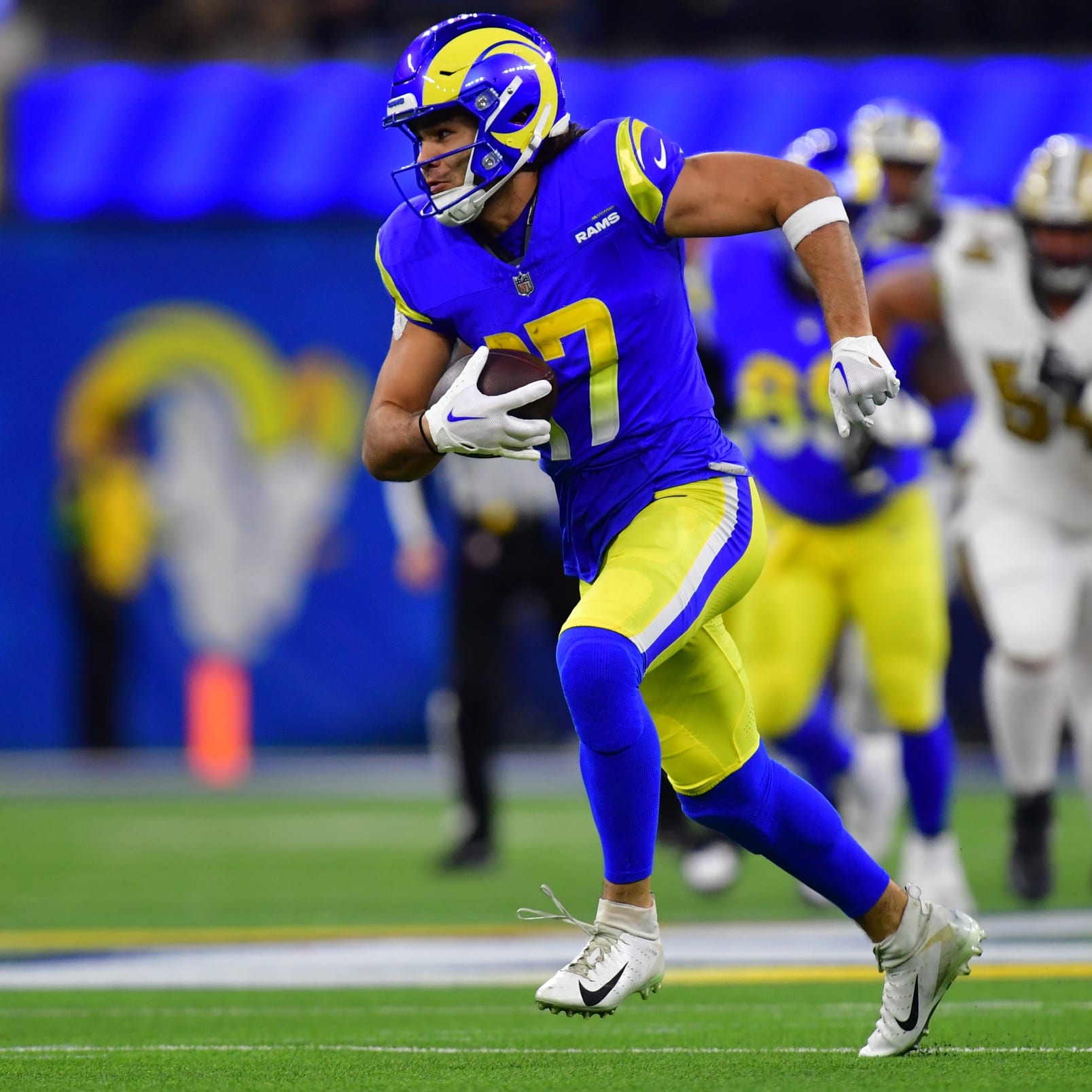This article is part of our Dynasty Strategy series.
Before we get started, I want to stipulate that this isn't a "you should try to acquire these guys" article. And it's also not a "you should trade these guys while their value is high" article. Those decisions are in your hands, with the right answer probably depending on whether your league-mates are overestimating, underestimating or properly estimating the value gains (some of which are rather obvious, e.g., Josh Jacobs).
My goal here is simply to point out players that are more valuable right now than they were two weeks ago before the start of free agency and the 2024 league year. I'll sort by position, rather than the extent of perceived value gain, with my commentary elaborating on the latter.
Note: Kyle Pitts and Drake London are intentional omissions. They were mentioned in the previous run of this article, thanks to rampant speculation about Kirk Cousins joining Atlanta.
While the Bears may still fail to inspire confidence on an organizational level, it's been a long time since a No. 1 overall pick at QB entered the NFL with a better roster around him. That might've been true even if Chicago had a quiet offseason after going 7-10 with a minus-19 point different last year, but fortunately GM Ryan Poles was proactive this spring, swapping out WR Darnell Mooney for Keenan Allen, RB D'Onta Foreman for D'Andre Swift and TE Robert Tonyan for Gerald Everett.
That's three upgrades for the passing game, and the Bears also signed C Coleman Shelton and FS Kevin Byard while retaining seven of their top eight defenders in snap share and four of five starting offensive linemen. On top of that, they have the ninth overall pick in this year's draft (though not much else) and extra selections for 2025 in the second round and either fourth or sixth round (depending on how much Justin Fields plays for the Steelers). Chicago even has an easily navigable cap situation, with Swift, DE Montez Sweat and CB Jaylon Johnson being the only veterans whose contracts can't be dumped relatively painlessly next offseason. Then again, if anyone can screw this situation up it's the Bears.
OC Liam Coen is kind of an unknown, having bounced between the Rams and University of Kentucky the past six years while only calling plays at the collegiate level. It'd probably be better if the Bucs had retained Dave Canales, now head coach of Carolina, but the more important thing is that they re-signed both Mayfield and Mike Evans... plus S Antoine Winfield and LB Lavonte David. The roster is noticeably weak at cornerback and interior O-line, so it'll be important for the Bucs to get some Day 1 contributors from the upcoming draft.
 QB Will Levis
QB Will Levis
The combination of prospect profile, draft capital and rookie-year performance has me thinking Levis is more likely to be a high-end backup or low-end starter than a true franchise QB. However, fantasy football is about probabilities and "range(s) of outcomes", not binary thinking or certainties, and the Titans have done a good job this offseason lifting the ceiling for their young QB.
The first big move was hiring head coach Brian Callahan — formerly offensive coordinator of the pass-happy Bengals — who then poached highly regarded offensive line coach Bill Callahan (thanks, dad!) from the Browns to fill the same role in Tennessee. The Titans later signed WR Calvin Ridley and C Lloyd Cushenberry, and I tend to agree with the numerous mock drafters who connect the team with an offensive tackle at No. 7 overall.
 QB Drew Lock
QB Drew Lock QB Jacoby Brissett
QB Jacoby Brissett
Lock and Brissett found two of the better destinations for a backup QB to get playing time. Both might even be Week 1 starters, as Daniel Jones is rehabbing an ACL tear and New England may want to ease a rookie QB into things. The Patriots won't necessarily take said rookie QB at No. 3 overall, as they could either trade down or draft a wide receiver and then pick a signal-caller with a later selection. In the Giants' case, there's a scenario in which Jones is benched later in the year to protect the team against injury guarantees in his contract (a la Russell Wilson in 2023), though it might be a rookie rather than Lock who would take over the reins.
 RB Josh Jacobs
RB Josh Jacobs
Jacobs is arguably the biggest winner of all, and it's reflected in projections with a move from mid-to-low RB2 territory up to low-end RB1 range. A subpar 2023 hints at more risk compared to other running backs that will come off the board early in fantasy drafts, but there's also potential for a massive season with Jacobs joining an offense led by HC Matt LaFleur and QB Jordan Love. Even better that the Packers haven't brought in a strong backup, instead settling for a re-signing of AJ Dillon, who also struggled last year.
The motivation for swapping out Aaron Jones for Jacobs would seem to be a combination of age and the likelihood that the latter can hold up to larger workloads. Jacobs should be productive even if he only mimics the role Jones had when healthy, and there's an elite RB1 ceiling if the former Raider's usage stretches beyond that. Of all the places Jacobs reasonably could have landed, Green Bay is perhaps the best for receiving volume and one of the better spots for rushing efficiency. It also looks decent for touchdowns, though he might disappoint relative to the overall strength of Green Bay's offense given that his backup weighs 247 pounds and LaFleur's teams typically have recorded far more passing TDs than rushing scores.
 RB Joe Mixon
RB Joe Mixon
Mixon averaged at least 89.6 yards from scrimmage and 0.5 TDs per game in each of his last six years with Cincinnati, despite topping 4.1 YPC just once and generally looking mediocre as a runner. His downfall as a fantasy asset has been predicted for a few years now, but NFL insiders seem to hold a more favorable view than twitter analysts, with Mixon now landing in another situation featuring weak competition for playing time in what could be a top offense.
What's more, the Texans for some reason signed him to an extension after acquiring him for a seventh-round pick, guaranteeing a $6 million signing bonus, $3 million base salary for 2024 and $4 million of a $7 million salary for 2025. It's a genuinely baffling contract, given that Mixon is entering his age-28 season and previously was under contract for 2024 at a cost of around $5.75 million. The Texans now figure to pay him about $17 million for two seasons or $13.5 million for one year, which is good news both for Mixon and anyone that rosters him in dynasty.
#Texans Joe Mixon $27M extension has base value of $25.5M, $6M signing bonus, $13M total gtd, salaries $3M (gtd), $7M (gtd), $8M; annual $500K max in per game active roster bonuses, annual $500K rushing yards incentive @KPRC2
— Aaron Wilson (@AaronWilson_NFL) March 20, 2024
 RB Rachaad White
RB Rachaad White RB Chuba Hubbard
RB Chuba Hubbard RB Zamir White
RB Zamir White RB Rico Dowdle
RB Rico Dowdle
These guys are all returning to their 2023 teams and have either seen no new competition added (R. White, Hubbard), significant competition departed (Dowdle) or their backfield mate replaced by a clearly inferior player (Z. White). In Dowdle's case, his spot atop the depth chart is unlikely to hold up, but he does at least seem well positioned for another year as the No. 2... and possibly behind someone less talented/proven than Tony Pollard.
Hubbard and Rachaad White, meanwhile, are in backfields that currently look the same as in 2023, backed up by Miles Sanders and Chase Edmonds, respectively. TBD if that holds up; it certainly helps that the upcoming draft is considered weak at running back (and strong at numerous other positions). The Bucs still need help for their interior offensive line, while Carolina is in better position there after signing 330-pound guards Robert Hunt and Damien Lewis last week.
Dan Morgan says that as of now Chuba Hubbard is the lead back going forward. #Panthers pic.twitter.com/MsSbWDB1FI
— Sheena Quick (@Sheena_Marie3) February 27, 2024
And then there's White, the biggest winner of this quartet thanks to Vegas swapping out Josh Jacobs for Alexander Mattison. While his prospect profile coming out of Georgia a couple years ago wasn't especially exciting, White is now in excellent position to pile up touches for a team that seemingly intends to rely on its running game and defense.
For what it's worth, I tend to favor "selling high" when sub-elite RBs like these guys experience a value spike due to team context. I'm sure at least one or two of them will be useful/valuable in 2024, but a lot of times things don't work out for various reasons (e.g. injury, benching, team is awful) or the guy doesn't quite play well enough to avoid a timeshare/demotion the following year(s).
 RB Gus Edwards
RB Gus Edwards RB Zack Moss
RB Zack Moss RB Devin Singletary
RB Devin Singletary
Each of these three RBs signed with a new team that otherwise lacks a proven starter in the backfield. In Edwards' case, there's an added bonus of reuniting with offensive coordinator Greg Roman, who held the same role in Baltimore throughout most of Edwards' career. The other three RBs currently on the Chargers' roster have 144 combined carries in the NFL, so it's probably safe to assume the team will either sign another veteran or draft one somewhere between Rounds 2 and 5.
Edwards got a two-year, $6.5 million contract with slightly more than half the money guaranteed at signing, while Moss landed $8 million over two seasons but only $3 million guaranteed. The in-house competition looks slightly stronger for Moss, with 2023 fifth-round pick Chase Brown having shown well for the Bengals in limited action last year. Still, landing in Cincinnati is a much, much better outcome than staying with the Colts as a backup or joining another team with an established starter (both of which were definite possibilities for Moss before free agency).
Singletary got by far the strongest contract of the trio, signing a three-year, $16.5 million deal that includes $9.5 million guaranteed at signing. He arguably has even less behind him on the depth chart than Edwards does, albeit with more risk of playing in a lousy offense. Still, Singletary is at least in excellent position to get a lot of touches — more so than Moss and Edwards even — and the Giants also signed two of the better blockers available in free agency (G Jon Runyan and G/T Jermaine Eluemunor).
Gibson did surprisingly well in free agency, with $5.3 million guaranteed ranking eighth among available RBs and putting him ahead of Edwards, Moss, Austin Ekeler and AJ Dillon. It's a big enough contract to ensure Gibson gets a real chance at a significant role off the bench behind Rhamondre Stevenson, rather than simply fading into irrelevance or being forced to compete for a No. 2 job. The contract is in line with how I view Gibson, but I thought NFL teams might have a lesser opinion and wasn't sure he'd get high-end backup money. It only takes one, fortunately, though in this case it means joining what likely will be one of the lesser offenses in the NFL.
 WR Curtis Samuel
WR Curtis Samuel WR Darnell Mooney
WR Darnell Mooney
I wouldn't bet on either of these guys drawing enough targets to be startable in 10/12-team leagues, but they at least remain alive as fantasy commodities after signing nice-sized contracts with teams that have quality, veteran quarterbacks and no proven No. 2 wide receiver. I'll also note that Mooney suffered a severe ankle injury in 2022 — a fracture that likely came with ligament damage — and might be faster/stronger this upcoming season than he was during his first year back from the injury.
Mooney won't ever see 140 targets again the way he did in 2021 for a Bears offense with nobody else to throw to, but his efficiency could be impressive as a medium-volume deep threat who finally gets the chance to play with a quality passer. Samuel offers a bit more volume upside, especially because of his rushing contributions, but his aDOT will probably be about half of Mooney's. Samuel also has never played with an above-average passer despite logging seven seasons for two different teams, and he's only a year older than Mooney (28 in August) because he was drafted when he was 20.
 WRs Michael Wilson & Greg Dortch
WRs Michael Wilson & Greg Dortch
Relative to consensus / other fantasy players, I'm optimistic about Dortch and pessimistic about Wilson, figuring the former will probably see more targets than the latter if he finally gets his chance as a full-time slot man without needing injuries ahead of him to stay in the lineup. That's not a guarantee at this point, but it is a possibility.
Of course, we're not talking about a ton of upside given the likelihood that WR Marvin Harrison and TE Trey McBride lead Arizona in targets. Wilson, in particular, seems like a good 'sell' candidate if you can find a true believer. Dortch probably still isn't worth enough to trade in most formats, even if he's worth a back-end roster spot.
This is kind of the same deal as the Arizona guys; there's no denying the opportunity ahead, but also not a ton of reason to think they'll make good on it. And the Chargers also seem likely to draft a pass catcher early, though it's not quite the same slam dunk as in Arizona's case. The Cardinals will probably take a WR even if they trade down; the Chargers might go for an o-linemen or defender under Harbaugh/Roman, infuriating fantasy nerds like me in the process.
The Jaguars have enough talent around Kirk that defenses can't solely focus on stopping him, but they don't have anyone else (like Ridley) who is a real threat to gobble up a huge portion of the WR targets. Swapping out Ridley for a lower-volume field-stretcher like Gabe Davis is a clear win for Kirk's fantasy value, especially given the previous possibility of Ridley taking on more of the slot and motion routes that went to Kirk last season.
We've probably used the term "make or break season" two or three times already, including in 2021 and 2022 when Brown started strong but then struggled immensely after his starting QB suffered a season-ending injury. Prior to that, he spent two years in the league's most run-heavy offense, posting good-but-not-great numbers on a per-route/per-target basis. 2023 brought his worst luck yet, as Brown spent the first half of the year with backup QBs and was then limited or absent due to a heel injury once Kyler Murray returned. This time, it's truly make or break, with Brown entering his age-27 season alongside an all-time-great QB in an offense that throws a lot of passes but doesn't have a ton of competition for downfield targets.
The Rams could still bring in Odell Beckham, Tyler Boyd or another wide receiver, but so far they've been content to re-sign Robinson and devote most of their cap space to offensive linemen (re-signing guard Kevin Dotson and signing guard Jonah Jackson away from Detroit). That's also good news for Puka Nacua and Cooper Kupp, though I'm not sure an addition like Beckham or Boyd matters much for guys at their level. Robinson is the one whose role/projection changes considerably if the Rams spend a decent chunk of money or an early draft pick on a WR.






 QB
QB  WR
WR  WR
WR  WR
WR 





